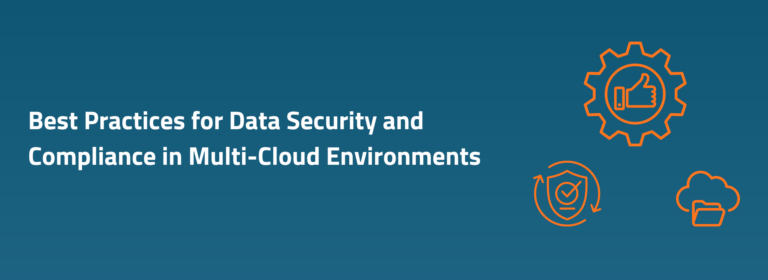Ensuring data security and compliance
in multi-cloud environments
In today’s rapidly evolving digital landscape, businesses are increasingly adopting multi-cloud strategies to leverage the best features and services from different cloud providers. While this approach offers enhanced flexibility, scalability, and cost-efficiency, it also introduces complex challenges in ensuring data security and compliance. As organizations navigate the complexities of multi-cloud environments, it becomes crucial to implement robust strategies that safeguard sensitive data and adhere to regulatory requirements. Here, we explore the best practices for ensuring data security and compliance in multi-cloud environments.
Understanding Multi-Cloud Environments
A multi-cloud environment refers to the use of multiple cloud computing services from different providers. Organizations adopt multi-cloud strategies to avoid vendor lock-in, optimize workloads, and enhance resilience. However, managing security and compliance across various platforms requires a comprehensive and cohesive approach.
The key challenges in multi-cloud security and compliance include the complexity of management as each cloud provider has its own set of security tools, policies, and compliance frameworks, in which management and integrating these can be complex. In addition, ensuring visibility and control over data spread across multiple clouds is challenging, as organizations must maintain a clear understanding of where their data resides. A final layer of complexity is added as different industries and regions have specific regulatory requirements for data protection.

Best Practices for Data Security and Compliance in Multi-Cloud Environments
- Data Encryption: Encrypt data both at rest and in transit to protect it from unauthorized access. Utilize robust encryption standards and manage encryption keys securely using tools like AWS Key Management Service (KMS), Azure Key Vault, or Google Cloud Key Management.
- Identity and Access Management (IAM): Implement strong IAM policies to control access to resources across all cloud platforms. Use role-based access control (RBAC) and the principle of least privilege to limit access to only what is necessary for users to perform their tasks.
- Regular Audits and Compliance Checks: Conduct regular audits and compliance checks to ensure that all cloud environments meet the required security standards and regulatory requirements. Use automated tools to continuously monitor and report compliance status.
- Data Loss Prevention (DLP): Implement DLP solutions to monitor and protect sensitive data from accidental or malicious loss. DLP tools can help detect and prevent data breaches by monitoring data flows and enforcing data protection policies.
- Network Security: Secure your cloud networks by implementing firewalls, virtual private clouds, and secure VPN connections. Use network segmentation to isolate sensitive data and workloads, reducing the risk of unauthorized access.
- Incident Response Planning: Develop and regularly update an incident response plan tailored to a multi-cloud environment. Ensure that the plan includes procedures for detecting, responding to, and recovering from security incidents across all cloud platforms.
- Employee Training: Educate employees about the specific security and compliance challenges of multi-cloud environments. Regular training sessions can help ensure that staff are aware of best practices and potential risks.
Adopting a multi-cloud strategy offers numerous benefits but also brings significant challenges in terms of data security and compliance. By implementing a comprehensive and unified approach to security management, leveraging advanced tools and technologies, and fostering a culture of security awareness, organizations can effectively safeguard their data and maintain compliance across all cloud environments. Ensuring robust data security and regulatory compliance not only protects sensitive information but also builds trust with customers and stakeholders, ultimately contributing to the long-term success of the business.


